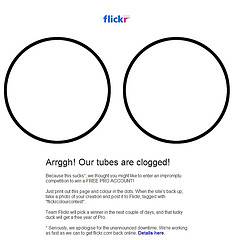Long-time readers of Read/WriteWeb may recall that I used to do a weekly summary of
the top stories of the week, called the Web 2.0 Weekly
Wrap-up. It ran all through 2005 and for a long time was the most popular feature on
R/WW. I decided to put it to one side at the start of 2006, but now may be a good time to
resurrect it…
Netscape’s offer and Flickr’s clogged tubes
PR over Netscape’s community news re-design went from
bad to worse with
a NY Times profile on Monday (btw I was interviewed for that, but much to my
disappointment my remarks were left on the cutting room floor). Later in the week Jason
Calacanis
turned up the bluzzometer (which is a blog buzz measuring tool) with his offer to pay
the top bookmarkers at Digg, Reddit, Flickr and other places $1000 per month for doing
their thing on Netscape.com. In my post I noted that
this essentially amounted to an offer to buy out digg users.

From the ‘It ain’t broke, honest!’ department, MySpace had some issues with
hacking and Flickr had a
“temporary storage glitch” (see image to the left, by ASurroca).
Meanwhile young YouTube hit a stats milestone this week, with
the news its users are now watching more than 100 million videos per day. Later in
the week there was some controversy
about content ownership on the service.
BigCo Action
The week started with lots
of Yahoo news. They released their new
Ajax-powered homepage to the masses and also gave Yahoo Finance a facelift. Things
turned slightly custardy later in the week though, when Yahoo’s stock went down after
their second quarter
results. Apple reported rosier third-quarter results,
eBay also announced earnings, Microsoft had its 4th quarter
results and (to complete the set) Google announced its Q2 results.
Microsoft announced
a partnership with Nortel around “unified communications” – meaning e-mail, IM,
telephony, and multimedia conferencing. Microsoft also made blog headlines by pledging to
play fair with others, in a set
of 12 principles.
Neil Patel wrote a
great post detailing Google’s growing list of domains – they now own 520 of them. My
favorite: richardsbrain.com (I’m afraid, very afraid…). In other Google news, one of
their execs had the nerve to challenge the Father of the Web
Tim Berners-Lee.
Scoop of the Week
ThinkSecret
scooped the news that Apple will announce movie rentals through the iTunes Music
Store, at Apple’s upcoming Worldwide Developers Conference in a few weeks. For reactions,
check out the TechMeme scrum
about the story.
Product Plays of the Week
In product news, podcasting startup Odeo released a new service called Twttr – described
by Sid Yadov as “a new tool which helps you stay in touch with your friends through
SMS”.
In search news, Ask.com released a product called RSS Smart Answers and Google
released a product called Accessible Search – a
“web search for the visually challenged.”
On the enterprise side, Salesforce.com released Summer ’06 – 20th generation of
their online CRM service (see also my interview).
Buys of the Week
RSS feed management powerhouse Feedburner
purchased RSS analytics startup Blogbeat. Microsoft was busy this week, acquiring Softrucity
Inc. (a provider of application virtualization and dynamic streaming technologies)
and Winternals Software (a
small maker of Windows utility programs). From the ‘I want a piece of that action’
dept, Amazon Jeff Bezos is investing
in trendy web design firm 37Signals.
Pageturner of the Week
By which I mean, best analytical post (not counting my own posts, of course). Tim
O’Reilly’s ‘Levels of the Game: The Hierarchy of Web 2.0 Applications’ is required reading for those who want to understand “the dynamics of the network
economy”, as he put it.
Blog headline of the Week
Mike Arrington’s TechCrunch protege Marshall Kirkpatrick came up with the memorable
headline: Got
Herpes? Try Prescription4Love. I’m guessing it was a deliberate ploy to
get on Valleywag.
On that dodgy note…
That’s a wrap for another week! (yes, my old catchphrase is
back too)









